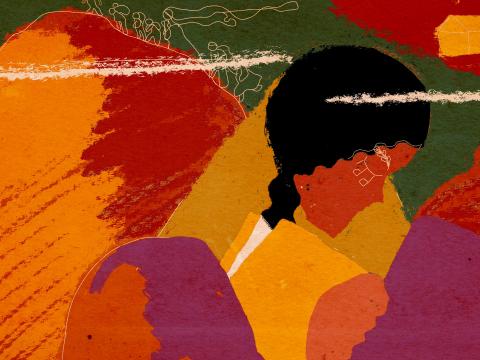In the End, Hope Prevails

This is the story of twenty-one-year-old Fatma—a tale of strength, endurance, passion, and hope prevailing. Fatma is currently preparing for her final year in high school. Since childhood, she has dreamed of becoming a pharmacist. Reaching this point has not been easy for Fatma. Despite her relatively young age, she has already seen and experienced much.
Originally from Telafar, a city 63 km away from Mosul, Fatma was only thirteen when the conflict of 2014 began. Living under conflict at such a young age forced Fatma to grow up quickly and understand things beyond her years. Fatma recalled, “I was thirteen years old then. I was in the sixth year of primary school. I became more aware of the world when I saw how they forced us to wear khimar (a traditional garment that covers a woman’s face and body). I don’t know how to describe it for you. We were very scared of them. I was thirteen, and I started to wear khimar. Before, I did not wear a veil at all. I wore khimar and was not allowed to leave the house. My parents were fearful for our safety, and they didn’t allow us to go out because of the militia.”
Fatma and her family endured the conflict for a year and a half. During this time, Fatma left school because her family was concerned for her safety, and the school curriculum promoted extremist ideologies. Fatma said, “I love to study, so it was a very difficult time not being able to go to school.”
Fatma’s family lived in constant fear, worried that the militia might take away her father and brother or that they might be attacked by missiles, as their home was near where the militias were based. Life became unbearable, and the future seemed bleak. As a result, Fatma’s father decided to smuggle his family to Syria. Fatma recounted, “It was the end of the week at four in the afternoon when we left Telafar with forty other people. We reached Syria at two in the morning. We settled in Azaz (a city 505 km away from Telafar). We stayed in Syria for six months.”
While in Syria, Fatma and her family lived in a mosque for two months before moving to a rented house. “We felt unwelcome,” Fatma said about her experience in Syria. The family then attempted to cross into Türkiye through smugglers. Fatma’s father paid 700 US$ per person, but they were caught by soldiers at the border and couldn’t cross. The next day, Fatma’s father and grandfather decided to stay behind in Syria while the rest of the family continued their journey across the border. Fatma remembers, “We left at one in the morning. We walked and climbed the mountains. It was cold and rainy. But this time, we crossed the border. My father and grandfather joined us three months later, and we were reunited.”
Fatma and her family settled in Ankara, Türkiye, for six and a half years. Despite financial difficulties, Fatma felt safe, secure, and peaceful during this time. They lived in a rented home, and her father and eldest brother, who was nine years old, started working in a print shop. Fatma burst into tears as she recalled not being able to study while in Türkiye: “We were comfortable, but despite several attempts, I couldn’t study there. We had to pay to attend school.”
However, as their time in Türkiye drew to a close, Fatma and her family once again felt unwelcome, as locals told them to return home. Fatma said, “When we went to the market, people told us to go home. It bothered us, so we returned to Iraq.”
Upon their return to Iraq, Fatma’s father sold their house in Telafar and bought a new one in Mosul. Today, Fatma lives in Mosul with her six siblings and parents. Upon returning, Fatma applied for external exams to complete the sixth year of primary school and succeeded. Her siblings also returned to school.
Fatma’s house was located in the same neighbourhood as World Vision Iraq’s office in Mosul. When Fatma was eighteen, she visited the office and learned about the savings group, part of the Safe Return Project, an Australian Aid initiative implemented by World Vision Iraq. She eventually joined the savings group, which comprises community members who agree to save and deposit a certain amount of money periodically. Each member has the right to withdraw a loan equal to three times the amount saved, to use it for engaging in income generating activities, or paying any unplanned household expenses. The loan is re-payed on a monthly basis.
Last year, Fatma joined nine other women in saving money twice a month. After a year of participating in the savings group, she was able to withdraw her savings and used the money to buy school textbooks in preparation for her final external exams for the third year of secondary school. Fatma said, “It was my first time learning about savings groups. After a year, I collected my savings, six months before the external exam so I could prepare myself. I studied, thanks to God. I am saving money continuously. It is very nice and enables a person to develop themselves and achieve their goals. In the future, I just want to pass the sixth grade exam. I want to become a pharmacist one day. I have always wanted to graduate.”
On World Youth Day, Fatma shares a message with other young people: “You must pursue your dreams and never give up.”
Through the Safe Return Project’s savings group activity, 1,241 women participated in savings groups in Hamdaniyah and Mosul. This activity aims to help women build financial resilience by supporting them to save together in a safe, convenient, and flexible way.